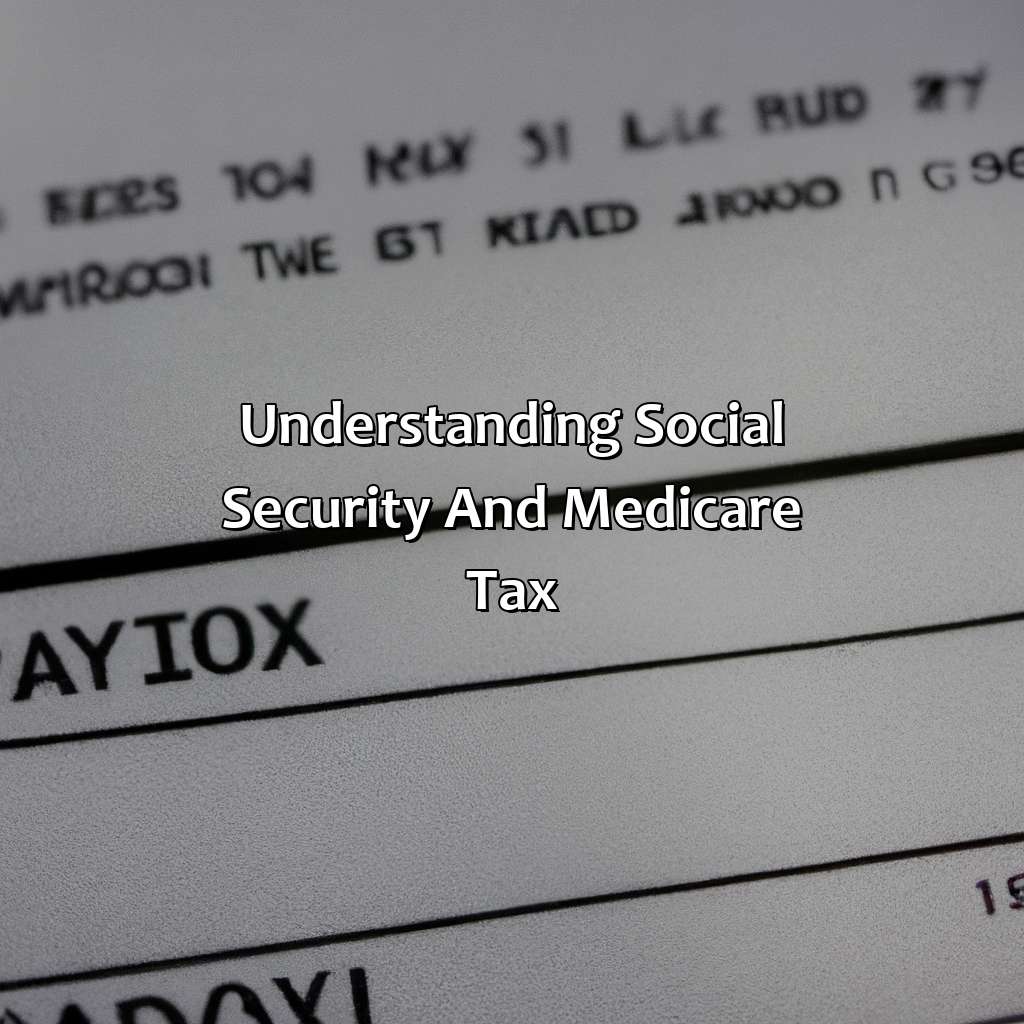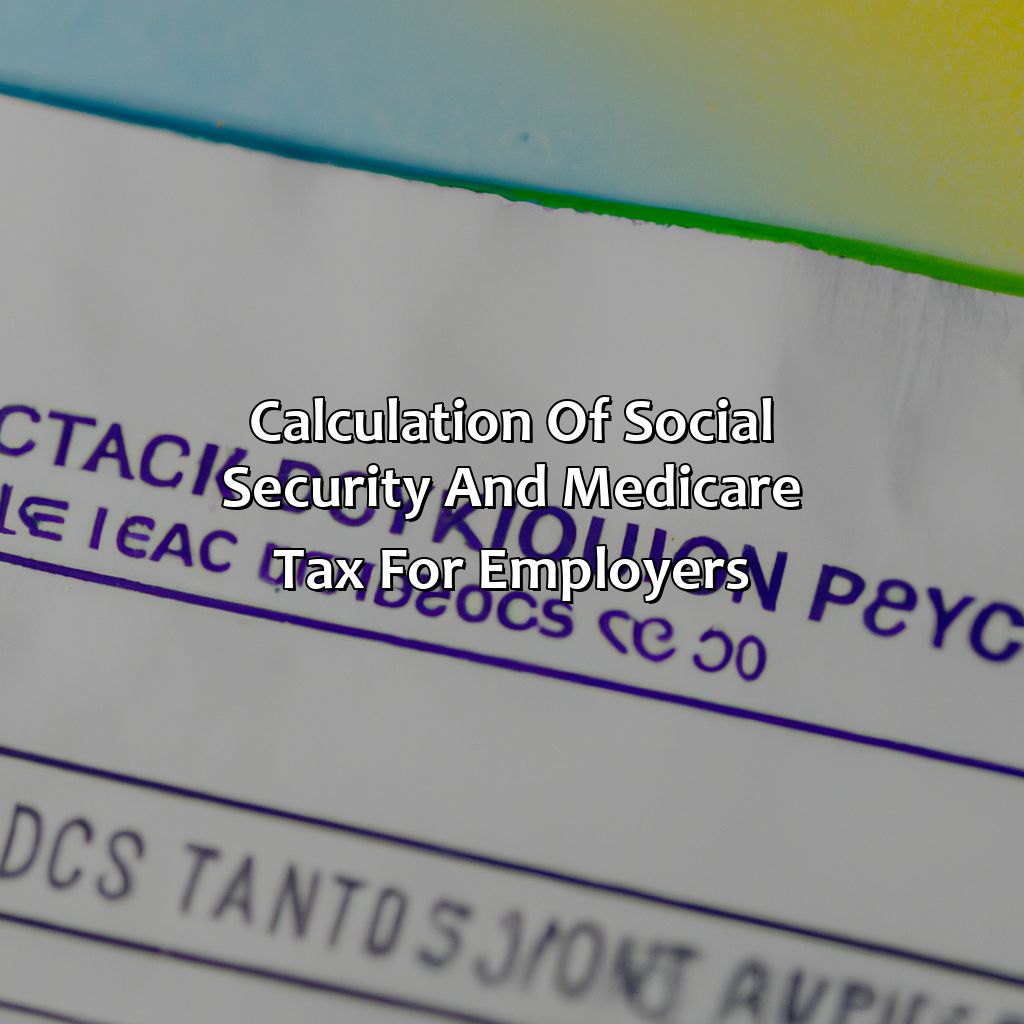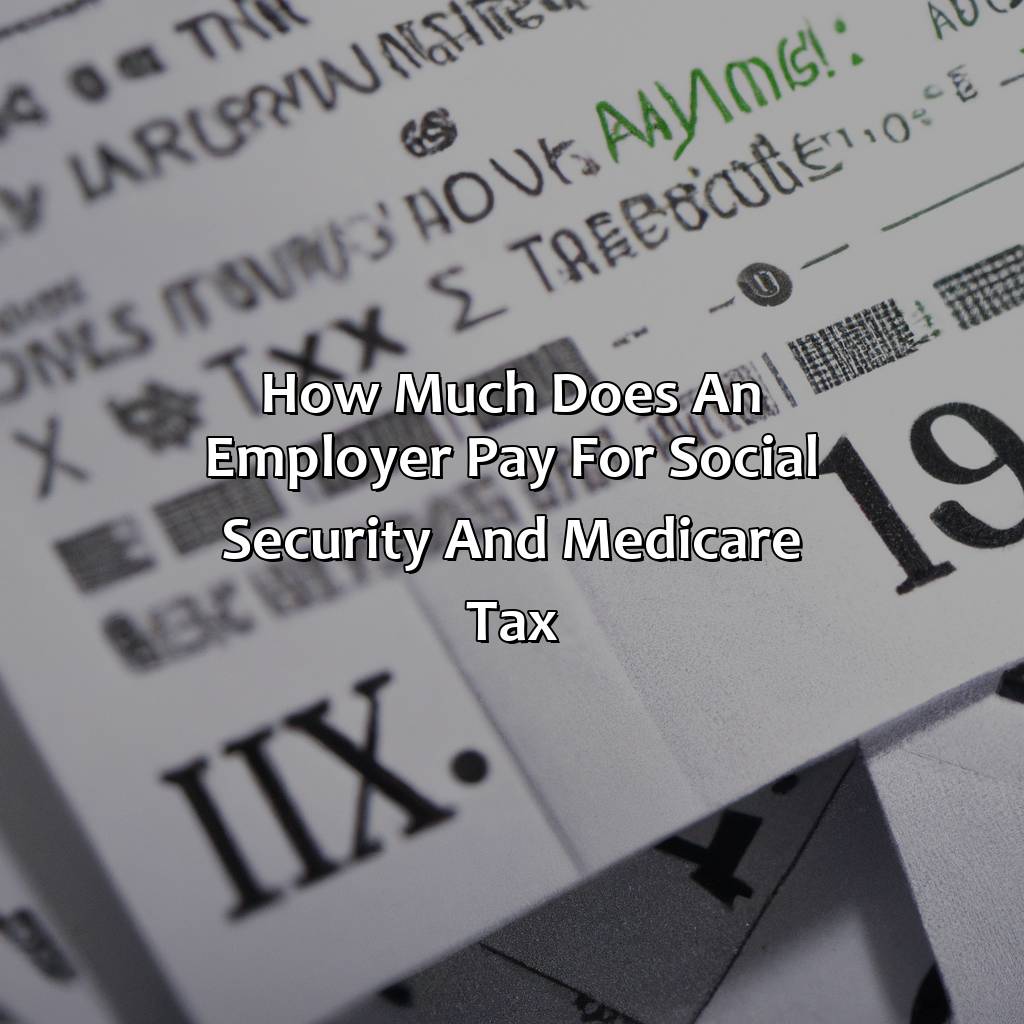How Much Does An Employer Pay For Social Security And Medicare Tax?
Key Takeaway:
- Social Security and Medicare taxes are contributions made by employees and employers to fund retirement, disability, and healthcare benefits for eligible individuals.
- Employers are responsible for withholding these taxes from their employees’ paychecks and matching the amount contributed by each employee.
- The contribution rates for Social Security tax are 6.2% of taxable wages, up to a maximum wage base of $142,800 for 2021. For Medicare tax, the rate is 1.45% of all taxable wages, with an additional 0.9% for high-income earners.
Are you an employer wondering how much you owe for Social Security and Medicare taxes? This article breaks down the employer-side tax burden so you can plan and budget accordingly. You’ll understand exactly what your obligations are and how much you should expect to pay.
Understanding Social Security and Medicare Tax
Are you curious to know how much your employer pays for social security and medicare tax? Then take a deep dive into the section of “Understanding Social Security and Medicare Tax”. Check out the sub-sections of “Definition and Purpose” and “Contribution Rates”. This will give you a complete understanding of these taxes. You’ll also find out the rates at which employers are expected to contribute.

Image credits: retiregenz.com by Yuval Woodhock
Definition and Purpose
Social Security and Medicare tax payment is a mandatory obligation for employers in the United States. This tax system is crucial in providing financial support to retired, disabled, and qualified recipients of healthcare services. Employers are required to pay a percentage of their employees’ earnings into this social security and medicare fund.
The purpose of this tax is to ensure the continuous provision of benefits for eligible individuals and families. The social security portion provides retirement, disability, survivorship, and children’s benefits. The medicare portion provides health insurance coverage for people who are 65 years or older, as well as for those with certain disabilities.
It’s important to note that the percentage employers pay towards social security and medicare taxes differ. Employers are required to pay 6.2% on an employee’s income up to $142,800 in 2021 for Social Security tax and also contribute an additional 1.45% toward Medicare taxes on all wages paid annually.
According to the official United States Government Publishing Office (GPO) website, approximately 96 percent of workers are covered by social security protection globally.
Get ready to contribute like a Big Spender, because this section is all about the Social Security and Medicare tax rates.
Contribution Rates
When it comes to supporting Social Security and Medicare, employers have an obligation to contribute certain rates of taxes. These contributions help support both programs ensuring that people receive the benefits they need.
- Employers pay 6.2% of an employee’s wages for Social Security tax.
- Employers pay 1.45% of an employee’s wages for Medicare tax.
- If an employee earns over $200,000 in a year, there is an additional 0.9% tax for Medicare that employers must pay.
- The maximum taxable amount for Social Security tax is $142,800 (as of 2021).
- The maximum taxable amount for Medicare tax has no limit.
- Self-employed individuals are responsible for paying both the employer and employee portion of the taxes.
Additionally, employers should be aware that there are also penalties in place if they fail to contribute the correct amounts or do not withhold enough from their employees’ salaries.
It may surprise some to know that when Social Security was first introduced in 1935, payroll taxes were initially set at just 1%. However, by the mid-1950s, Congress gradually increased this rate until it reached its present-day rate of 6.2% – meaning that although contribution rates have changed over the years enforcing them has remained just as vital as ever before.
Sorry to break it to you, but when it comes to Social Security and Medicare tax, it’s not just the tooth fairy footing the bill.
Who Pays Social Security and Medicare Tax?
Who pays Social Security and Medicare Tax? Discover the employer’s and employee’s roles. Learn the differences between them.
The employer has certain obligations for these taxes. As does the employee. They both pay.

Image credits: retiregenz.com by James Jones
Employer’s Role
Employers play a crucial role in funding Social Security and Medicare benefits. They are responsible for withholding the employee’s share of Social Security and Medicare taxes from their wages, matching this amount and paying it to the government. The employer must also report these taxes to the IRS annually and provide employees with a W-2 form that lists the total amount of taxes withheld. This ensures that employees can qualify for benefits when they retire, become disabled, or need medical care.
In addition to withholding and matching FICA taxes, employers also have other responsibilities, such as verifying employees’ identities and eligibility for employment authorization. Employers must also keep accurate records of employee compensation and taxes paid in case of an audit by the IRS.
While it may seem like a burden for employers to bear these responsibilities, providing Social Security and Medicare benefits is essential for maintaining healthy communities. These programs help protect seniors and people with disabilities who might not otherwise be able to afford medical care or retirement income. Employers who contribute to these programs are helping ensure that their employees have a stable financial future.
Looking back at history shows how significant these programs have been throughout time – from President Roosevelt signing the Social Security Act in 1935 to President Johnson signing Medicare into law in 1965. These programs have helped millions of Americans access healthcare, retirement income, and disability benefits over the years.
Why do we pay social security and Medicare tax? So we can eventually retire and have the time to stress about how much we paid into it.
Employee’s Role
As an active participant in social security and Medicare tax, employees play a significant role in contributing towards their future benefits. These taxes are automatically deducted from an employee’s paycheck by the employer, and the percentage is based on the employee’s earnings.
The employee’s share of social security tax is 6.2% of their gross income up to a certain limit, while Medicare tax is 1.45% of their total earnings. However, employees who earn above a specific amount may need to pay an additional Medicare tax of 0.9%.
It is crucial for employees to understand the implications of these taxes on their long-term financial planning, as they can impact their retirement benefits directly. Employees who have not paid enough in social security taxes may not be eligible for full benefits upon retirement.
Additionally, self-employed individuals have different rules regarding social security and Medicare contributions that must be considered when planning for future retirement benefits.
I know a friend who underestimated the importance of paying into social security adequately while running her business independently. Upon reaching retirement age, she realized that her lack of contributions had severely impacted her ability to receive significant financial support from social security. Hence, it is essential to plan strategically and pay these taxes regularly and accurately to ensure stable financial support post-retirement age.
Looks like employers have to pay a hefty tax bill for Social Security and Medicare – it’s not like they can just swipe a company credit card on this one.
Calculation of Social Security and Medicare Tax for Employers
Need to pay social security and Medicare tax as an employer? Look to the “Calculation of Social Security and Medicare Tax for Employers” section. It’s got the solutions. Check out the sub-sections:
- taxable wages,
- contribution rates,
- examples and scenarios.
This’ll help you understand how to calculate taxes, based on your employees’ salaries and the applicable rates.

Image credits: retiregenz.com by James Woodhock
Taxable Wages
The amount of earnings subject to social security and Medicare taxes is known as ‘Remuneration Subject to FICA‘. This amount includes salaries, wages, and tips. However, not all income is subject to these taxes.
| Year | Social Security Wage Base | Medicare Tax Rate (%) |
| 2020 | $137,700 | 1.45% (Employee and Employer each pay) |
| 2021 | $142,800 | 1.45% (Employee and Employer each pay) |
Note that for self-employed individuals, the social security tax rate is 12.4%, with a wage base of $142,800 for 2021.
It is important to note that there are various exceptions on what may constitute taxable wages. For instance, some benefits such as life insurance premiums are not taxable. Non-cash fringe benefits such as educational assistance or employee discounts may also be excluded from taxable wages.
Employers can manage their payroll expenses by planning ahead of time and being aware of how much they have to contribute towards Social Security and Medicare Taxes. One way to save money would be controlling an employee’s taxable wages by providing more non-taxable benefits like food or parking rather than salary raises.
Additionally, employers may also claim a credit for the employer portion of social security paid when claiming on tax returns for employer-sponsored health care coverage provided to retirees above age 65 or disabled employees.
Nobody said death and taxes were avoidable, but at least with contribution rates you can calculate exactly how much you’re being stabbed in the back by the government.
Contribution Rates
Social Security and Medicare Contribution Rates essentially refer to the amount that an employer pays towards Social Security and Medicare taxes for their employees.
- Employers are required to contribute 6.2% of each employee’s wage towards Social Security tax, up to a maximum income threshold.
- Employers also contribute 1.45% of each employee’s wage towards Medicare tax with no income limit.
- The employer must withhold an equal amount from the employee’s wages as well, except for additional Medicare withholding of .9%.
- If an employee earns more than a specific income threshold, they may be subject to an additional Medicare tax of .9%, which only applies to the employee, not the employer.
Additionally, it is important to note that self-employed individuals must pay both the employer and employee portions of Social Security and Medicare taxes themselves.
A fascinating fact is that these contribution rates have been adjusted multiple times throughout history. In fact, in the early days of Social Security, employers only contributed 1% of their employees’ wages towards this tax!
Get ready for some math that even your calculator will need therapy after.
Examples and Scenarios
For businesses, understanding how much they need to pay for social security and Medicare tax is vital. Let’s take a look at some examples and scenarios below.
| Employee Gross Pay | Social Security Tax (6.2%) | Medicare Tax (1.45%) | Total Taxes Paid by Employer |
|---|---|---|---|
| $1,000 | $62.00 | $14.50 | $76.50 |
| $2,500 | $155.00 | $36.25 | $191.25 |
| $5,000 | $310.00 | $72.50 | $382.50 |
It’s worth noting that the calculation of social security and Medicare taxes for employers is based on the employees’ gross pay and the employer pays an equal amount as taxes for each employee.
To ensure accuracy, it’s recommended to use a reputable payroll service provider or hire a certified public accountant experienced in calculating these taxes for businesses of all sizes.
By understanding how to calculate social security and Medicare taxes for employers, businesses can better manage their finances and avoid potential tax penalties or headaches down the line.
Five Facts About How Much Employers Pay for Social Security and Medicare Tax:
- ✅ Employers pay 6.2% for Social Security tax on employee wages up to $142,800 and 1.45% for Medicare tax on all wages. (Source: IRS)
- ✅ Self-employed individuals must pay both the employer and employee portions of Social Security and Medicare taxes. (Source: Investopedia)
- ✅ Employers may be required to pay additional Medicare tax of 0.9% on wages above certain income thresholds. (Source: IRS)
- ✅ Employers are required to file Forms W-2 to report employee compensation and Social Security and Medicare taxes withheld. (Source: IRS)
- ✅ The Social Security and Medicare tax rates may change each year based on the federal budget and economic factors. (Source: Forbes)
FAQs about How Much Does An Employer Pay For Social Security And Medicare Tax?
What is the current rate that an employer pays for social security and medicare tax?
The current rate that an employer pays for social security tax is 6.2% on income up to $142,800 and the current rate for Medicare tax is 1.45% on all income.
Does an employer have to pay social security and medicare tax for all employees?
Yes, an employer is required to pay social security and medicare tax for all employees, regardless of their salary or position.
Is there a limit to how much social security and medicare tax an employer has to pay?
No, there is no limit to how much an employer has to pay for social security tax. However, there is a cap for the social security portion of the tax. An employer pays 6.2% on income up to $142,800 for the 2021 tax year. There is no cap for the Medicare portion of the tax.
How does an employer pay social security and medicare tax?
An employer pays social security and medicare tax by withholding the employee’s portion of the tax from their paycheck and matching it with their own contribution. The employer then pays the combined amount to the IRS using form 941.
What happens if an employer fails to pay social security and medicare tax?
If an employer fails to pay social security and medicare tax, they may face penalties and interest charges. The IRS may also take legal action to collect the unpaid taxes.
Can an employer opt out of paying social security and medicare tax?
No, an employer cannot opt out of paying social security and medicare tax. It is a required tax that all employers must pay for their employees.


